Book contents
- Frontmatter
- Contents
- List of contributors
- Preface
- Table of cases
- Table of international instruments
- List of abbreviations
- Introduction
- PART I The Foundations of International Law and Their Impact on Secession
- 1 Secession and self-determination
- 2 Secession, terrorism and the right of self-determination
- 3 Secession and external intervention
- 4 The role of recognition in the law and practice of secession
- 5 The State as a ‘primary fact’: some thoughts on the principle of effectiveness
- 6 A normative ‘due process’ in the creation of States through secession
- 7 Secession and the law of State succession
- 8 Are there gaps in the international law of secession?
- PART II International and Domestic Practice
- 15 Conclusions
- Select bibliography
- Index
2 - Secession, terrorism and the right of self-determination
Published online by Cambridge University Press: 23 July 2009
- Frontmatter
- Contents
- List of contributors
- Preface
- Table of cases
- Table of international instruments
- List of abbreviations
- Introduction
- PART I The Foundations of International Law and Their Impact on Secession
- 1 Secession and self-determination
- 2 Secession, terrorism and the right of self-determination
- 3 Secession and external intervention
- 4 The role of recognition in the law and practice of secession
- 5 The State as a ‘primary fact’: some thoughts on the principle of effectiveness
- 6 A normative ‘due process’ in the creation of States through secession
- 7 Secession and the law of State succession
- 8 Are there gaps in the international law of secession?
- PART II International and Domestic Practice
- 15 Conclusions
- Select bibliography
- Index
Summary
Anti-terrorism treaties and secessionist struggle
One of the historical obstacles confronting the achievement of an internationally agreed definition of terrorism, as a crime under international law, has been support by some governments for the legitimacy of the use of force by peoples subjected to oppressive regimes. This support has extended into the negotiation of international treaties aimed at defining terrorist acts as crimes, and determining forms of international co-operation to punish such crimes. A clear illustration of such support can be found in the Convention of the Organisation of the Islamic Conference (OIC) on Combating International Terrorism of 1999:
Article 2(a) Peoples' struggle including armed struggle against foreign occupation, aggression, colonialism, and hegemony, aimed at liberation and self-determination in accordance with the principles of international law shall not be considered a terrorist crime.
This definition of what is not a terrorist crime, of course only applies in the context of this particular Convention, but other non-universal Conventions include similar exclusions. Consider the 1999 OAU Convention on the Prevention and Combating of Terrorism 1999:
Article 3(1) Notwithstanding the provisions of Article 1, the struggle waged by peoples in accordance with the principles of international law for their liberation or self-determination, including armed struggle against colonialism, occupation, aggression and domination by foreign forces shall not be considered as terrorist acts.
Lastly, consider also Article 2 of the Arab Convention on the Suppression of Terrorism 1998:
All cases of struggle by whatever means, including armed struggle, against foreign occupation and aggression for liberation and self-determination, in accordance with the principles of international law, shall not be regarded as an offence. […]
- Type
- Chapter
- Information
- SecessionInternational Law Perspectives, pp. 46 - 64Publisher: Cambridge University PressPrint publication year: 2006
- 1
- Cited by

